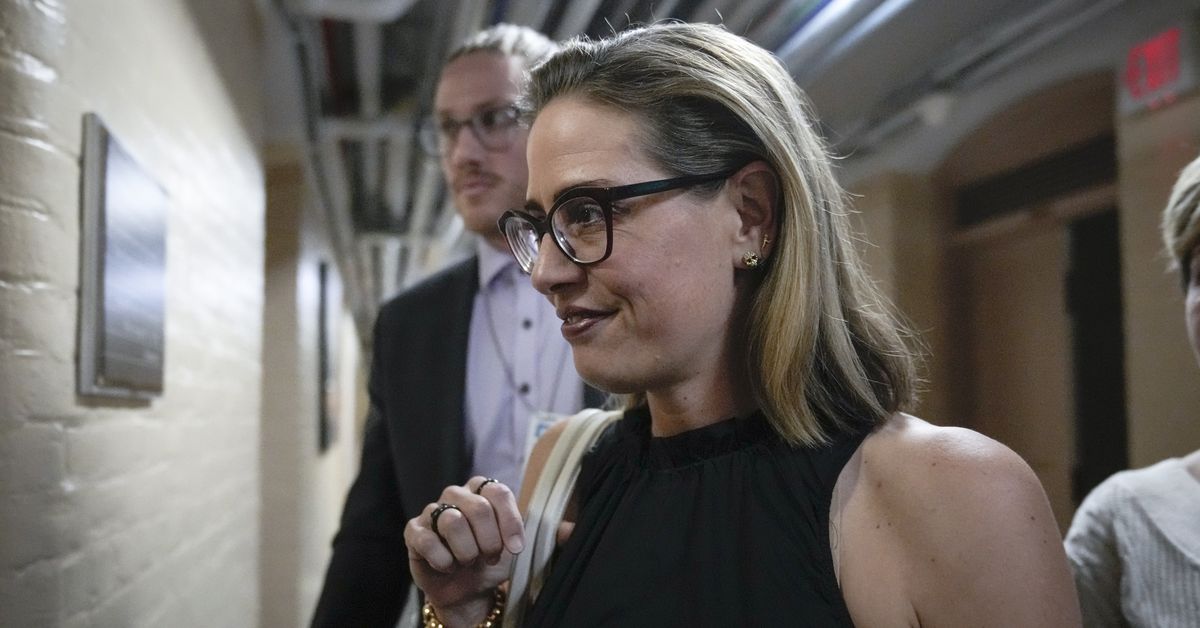More than a year after beginning negotiations on the legislation, Senate Democrats finally have all 50 of their members on board for a budget reconciliation bill that will fund several of President Joe Biden’s key priorities and give them policy wins on climate and health care ahead of the midterm elections.
On Thursday, Sen. Kyrsten Sinema (D-AZ) signaled she would support the latest iteration of the legislation, known as the Inflation Reduction Act, clearing its way for passage this weekend. Sinema, a longtime holdout on the bill, was the last lawmaker Democrats needed to get on board in the Senate after Sen. Joe Manchin (D-WV) said he was willing to move forward.
The legislation is now on track for a final vote this weekend, though it still has to overcome a few other hurdles before the Senate can approve it. The bill is still under review by the Senate parliamentarian, a nonpartisan rules expert who will determine whether the policies in the bill qualify for the reconciliation process Democrats want to use. This process allows them to pass the legislation with just 51 votes and no Republican support. If there are no major hiccups there, senators will have to endure a lengthy debate and amendment process known as the vote-a-rama, when any senator can propose additions to the bill, and force others to take uncomfortable votes.
“Subject to the parliamentarian’s review, I’ll move forward,” Sinema said in her Thursday statement.
What’s in the bill
Although this legislation is only a fraction of what Democrats initially proposed when they started this process, it still includes substantial investments in climate as well as major health care and tax proposals. All told, it’s expected to include more than $400 billion in spending and bring in over $700 billion in revenue, resulting in $300 billion worth of deficit reduction.
Sinema’s backing for the bill came with some strings attached. She said in her statement of support that the legislation will no longer close the carried interest tax loophole, a change she has long opposed that would have taxed money managers’ income at the same rate as other income. That provision was replaced with a 1 percent excise tax on stock buybacks, which is expected to make up for the revenue that the carried interest provision brought in.
The bill now contains provisions on the following:
- Health care, including allowing Medicare to negotiate prescription drug prices and extending ACA subsidies for three more years.
- Taxes, including a new corporate minimum tax of 15 percent, funding for IRS enforcement, and a new 1 percent excise tax on stock buybacks.
- Climate, including clean energy tax credits, environmental justice grants, and drought resilience funding.
Vox staff has an exhaustive look at how each will work here.
What’s next
Democrats are expected to get an update from the Senate parliamentarian on Friday, who could rule on whether aspects of the prescription drugs provisions qualify for the bill. After they get this judgment, lawmakers can then scrub and finalize the bill, and take out any policies that don’t pass muster. In general, policies need to have a clear impact on taxing and spending in order to qualify for a budget reconciliation bill. Recall that the parliamentarian previously ruled that the $15 minimum wage could not be approved via reconciliation because it did not have a significant enough impact on the federal budget.
After Democrats settle on a finalized version with the parliamentarian’s signoff, they can then begin the voting process. They’ll first take a procedural vote on Saturday that kicks off 20 hours of debate on the bill, and then they’ll hold a process known as a vote-a-rama, when any senator can suggest amendments to the legislation. Republicans are widely expected to use these amendments to put Democrats on the spot: Last year, for example, they forced Democrats to vote on issues where the party is divided, such as packing the Supreme Court.
Once the vote-a-rama is completed, lawmakers can then move on to final passage of the bill, which could come as soon as Sunday. After the Senate approves the legislation, it heads to the House, which is expected to break from its August recess to vote on it later this month.
Democrats also need most of their members on board in the lower chamber, where they could soon be down to a four-vote margin. Thus far, some of the moderate members who previously opposed the bill if it didn’t include a reinstatement of the state and local income tax (SALT) deduction, have signaled they are still willing to support the legislation, a sign that it’s likely to have the backing needed to pass. Additionally, progressive members, who’ve pushed back on pared-down policies in the past, have broadly expressed their support as well.
“When they send it to us, we’ll pass it,” House Speaker Nancy Pelosi said at a press conference last week.















![Jungkook’s Vlog was a great virtual ‘camping’ experience for ARMY [Watch] Jungkook’s Vlog was a great virtual ‘camping’ experience for ARMY [Watch]](https://st1.bollywoodlife.com/wp-content/uploads/2022/08/BTS-Jungkook-Camping-Vlog-600x315.png)




Discussion about this post